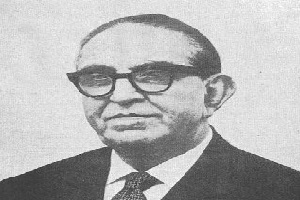During the 1920s, an affluent father wanted his son to become a barrister, a profession accepted by privileged Indian families in that era. But the son had no interest in studying law. He mounted on his ship of United Kingdom and waved his father goodbye. Halfway across the ocean he switched his ship and landed in Germany. Germany at that time was booming with chemicals and chemists. The son got his education and returned back in India with a degree in chemistry.
This was none other than Khwaja Abdul Hamied, the founder of Cipla. Coming from Germany with a Jewish wife and chemistry degree, he opened the Chemical, Industrial and Pharmaceutical Laboratories in 1935. This was the predecessor of Cipla which got renamed in 1984. Khwaja Abdul Hamied was a follower of Mahatma Gandhi and Jawaharlal Nehru. He opened his company with the aim to help the poorest of Indians get access to affordable and quality medicines.
Even after the partition, when Mohammad Ali Jinnah asked a fellow Muslim, Khwaja Hamied, to join Pakistan, Hamied refused. He was a follower of Gandhi and his sympathies were with India. Even while handing over his company to his son, Khwaja Hamied said, “Unlike other pharmaceutical companies around the world, we are not here to make profits but to bring relief and healthcare to the poor who may otherwise have to die for want of quality drugs.”
Yusuf Hamied was the son of Cipla’s founder who had studied chemistry at Cambridge University. He joined the company as an R&D officer. Under him, the bulk of the company’s drugs received USA’s FDA approval. In the 1990s, Cipla made a major breakthrough, they combined three anti-retroviral drugs into one dose. In 1991, the company made a breakthrough in cancer chemotherapy in partnership with the Indian Institute of Chemical Technology.
Later in 1995, they made the world’s first oral iron chelator named Deferiprone. They also created the world’s first dry powder inhaler device named Rothaler. In 2001, Cipla came up with HIV medicines at a cost of $350 per year per patient, when the whole world was charging $1200 approximately for the same.
At end of FY19, Cipla had a turnover of Rs 16,792 crores. They were the market leader with a share of 21.8% in respiratory therapy. Cipla has outranked every company to become the best provider of respiratory therapy. With its forte in respiratory disease solutions, Cipla plans to capitalise on the limited competition in the global respiratory medicines and therapies market. They plan to grow products that can deliver drugs into the body through the respiratory tract.
In short, the 86 year old company still has a long journey ahead.

 In the 1920s, an affluent father wanted his son to become a barrister. But the son chose to pursue chemistry instead. Learn the incredible story of Khwaja Hamied, the founder of Cipla.
In the 1920s, an affluent father wanted his son to become a barrister. But the son chose to pursue chemistry instead. Learn the incredible story of Khwaja Hamied, the founder of Cipla.













.jpeg)





.jpeg)





.jpg)


.jpg)



